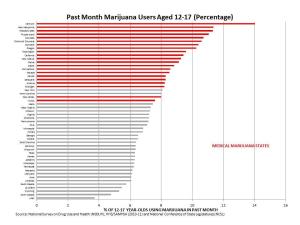Marijuana use rates in 12-17 year olds is highest in medical marijuana states
December 18, 2013
The ONDCP twitter account just posted a very interesting graph on past-month marijuana use rates in the 12-17 year old adolescent population.

This dovetails very nicely with a factoid being twittered today in the #MTF2013 hashtag which is covering the release of the mid-term data from the Monitoring the Future project.
this actually surprised me. That it was so low.
Of course, one’s first suspicion is that states which are liberal enough to pass medical marijuana laws might have adolescent populations that are more likely to smoke marijuana anyway, i.e., regardless of the medical legalization. Be nice to see a workup on teen marijuana use in these states before and after they legalized medical marijuana.
December 18, 2013 at 10:16 am
All this data comes from surveys, right? Some people are always going to be afraid to admit to doing something illegal, even if the survey data s claimed by the surveyor to be kept anonymous. Maybe kids are less afraid to admit to MJ use in states where its legality is less questionable due to the fact that so many people around them are using it perfectly legally.
(Well, not perfectly legally. Perfect would be if the federal government finally legalizes it.)
LikeLike
December 18, 2013 at 11:42 am
I think that speaks to my last point about general milieu of the state more than the nitty gritty of the individual decision criteria. If you look at
you can see that most MM sourcing is from someone else’s MM card, not their own. So still, illicit in the proximal sense.
But this is going to be a thorny problem for the epidemiologists to deal with as they try to figure out what happens with marijuana attitudes/use in Colorado and Washington, eh?
LikeLike
December 18, 2013 at 1:40 pm
I agree with Grumble. It is very probable that in states where Marijuana is not legal at all you may get more “under-reporting” …
LikeLike
December 18, 2013 at 6:13 pm
The thorny problem that epidemiologists face is not in attitudes. You can always ask what someone’s attitude is and expect a reasonably accurate answer (depending, of course, on how you phrase the question). Use is the gnarlier problem, but only if you’re interested in knowing “how much did usage change from before it was legal to after it became legal?” If you’re just interested in “how much do people use it now that it’s legal,” you will probably get better answers when it’s legal than when it’s not.
I’m not sure why the “how much did usage change” question would be interesting at all. Can’t we just say “of course usage will go up, duh?”
LikeLike
December 19, 2013 at 1:00 pm
I’m not sure why the “how much did usage change” question would be interesting at all. Can’t we just say “of course usage will go up, duh?”
because 10% is a considerably different scenario than 10X? It matters for public policy and the resources a responsible society would devote to various topics.
And at any rate, there is a species of denialist cannabis fan (we get them around here now and again) that insists that full legalization will do nothing to use rates. Their rationale is that pot is so easy to get that anyone who wants to smoke pot already does. I counter with the idea that they are biased by their subculture and proffer the counter example of *my* subcultures of interest in which there are tons of people for whom the only reason they do *not* smoke weed, on the odd occasion, is the legal status.
i think I even ran a poll on that once
LikeLike
December 19, 2013 at 5:51 pm
I’m not sure how we could possibly predict how much the number of users will rise, unless there is empirical data, not “will you use if it becomes legal” survey data – that’s almost certain to provide an underestimate.
“Resources society will devote to various topics” … like what? Clinics to care for all the cases of overdoses we expect? Oh, wait. We don’t expect any.
Government resources to regulate the market? Yeah, sure, but that can be figured out once there is a legal market.
LikeLike
December 19, 2013 at 11:15 pm
This contradicts CDC YRBSS data in state by state comparisons before and after implementation of MMJ laws:
http://www.cdc.gov/healthyyouth/yrbs/factsheets/index.htm
LikeLike
January 2, 2014 at 10:11 pm
http://dailycurrant.com/2014/01/02/marijuana-overdoses-kill-37-in-colorado-on-first-day-of-legalization/
LikeLike